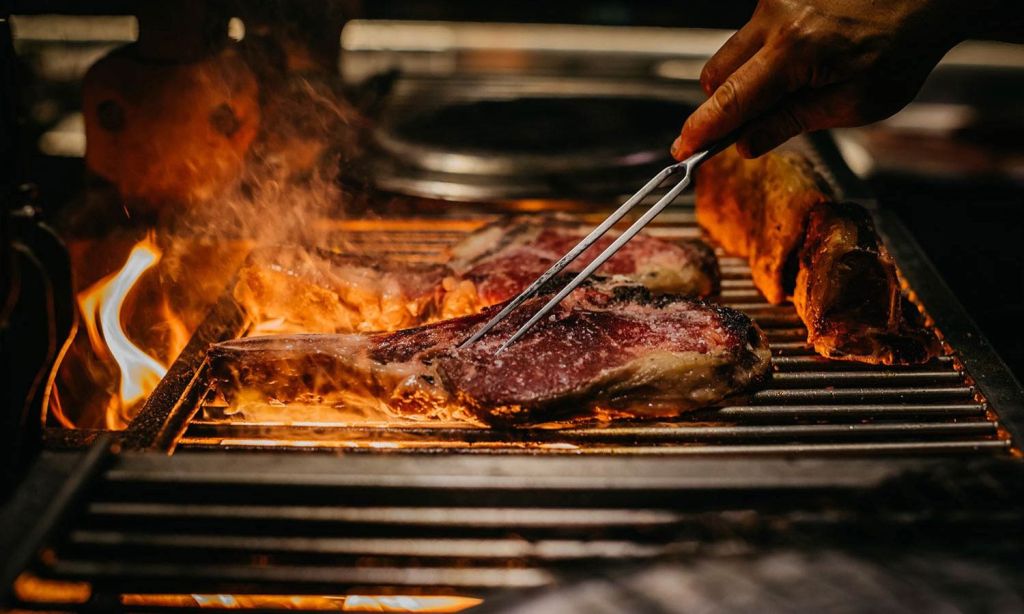I’ve been a vegetarian since I was four years old. I remember being in the car with my mum, eating salami, when I asked her where it came from. “A pig,” she told me. I was disgusted and decided then and there to stop eating animals. My parents thought it was a phase, but fast-forward to today and at 36, I’m still a strict vegetarian.
The way I’ve always viewed my diet restrictions is that it’s my lifestyle choice, so I never wanted to inconvenience anyone or ask for special treatment. That said, when I recently dined at Firedoor, a restaurant known for its meat, and paid the same price for the vego set menu, the thought crossed my mind: should the two menus really be the same price?
Firedoor is known for its meat — lamb, pork, chicken and beef — and shellfish, which is cooked on an open fire in a kitchen with no electricity. The menu is $195 for five courses, each presented with a story about the ingredients’ origins. The restaurant caters to all dietaries — you simply tell them when booking. But it’s all the same price.
This Reddit user summarised the general argument well: “I’m so sick of paying the same price for vegetarian options of a dish at a restaurant. If you are taking items off of a dish to make it vegetarian and not adding anything else, lower the price. It’s such a rip-off.”
With this reasoning, Firedoor’s vego set menu deserves to be the same price — it’s not created by just taking items off a dish to make it vegetarian, replacing the meat with another protein. Lennox Hastie, the restaurant’s head chef and owner, says his vegetarian menu wasn’t an afterthought — it was designed with intention.
“It’s about celebrating the ingredients that might often get overshadowed by meat and fish,” he says. “We source exceptional produce with vegetables grown by hand from small farms with each veggie at its peak, in its moment.”
Each step of creating Firedoor’s vegetarian dishes is considered, from selecting the wood for grilling the veggies, to their smoking, charring and seasoning. The veggie dishes align with the restaurant’s ethos of precision, cooking directly over fire and tasting each element at its peak.
Hastie didn’t mention the hard cost of the vegetables relative to the meat, but he adds that it’s a challenge to create dishes that bring out the complexity and depth of simple vegetables.
“I’ve never believed vegetables should be seen as less valuable than meat,” he says. “There’s a misconception that vegetarian dishes require less skill or effort, but they demand just as much, if not more, in terms of creativity and technique. The same thought, care and passion goes into each dish, whether it’s steak or roasted beetroot.”
Hastie also mentions the experience factor, which is what justified the price tag in my mind. My dinner was about three and a half hours. Same as with the meat dishes, I heard about where each ingredient came from. Many were served with flourishes.
Also, I knew there was no other way to experience Firedoor — which has appeared on Netflix’s Chef’s Table — that didn’t require me to pay full price. (Side note: I wrote about how on my visit I had the best seat in the house, seated at the counter, here.)
I liken the consistent set menu pricing to luxury brands like Chanel, Prada and Louis Vuitton never having sales. There’s no discounted way to buy their new products — they’re always full-price. If restaurants did have a cheaper set menu for vegetarians, who’s to say some non-vegos wouldn’t opt for that just to get a discount? Feigning a dietary and not experiencing what the restaurant is known for just to save some cash.
Also, having a different price for a vegetarian menu could open a can of worms. Those who eat seafood but no meat might want their meal discounted. And should you charge more for those who eat gluten-free with those ingredients sometimes more expensive to source?
“If you sit down to a plate of grilled vegetables that’s been caressed by fire, and it evokes a sense of connection to the land and season, you’ll understand,” says Hastie. “You’re not just paying for the ingredients, you’re paying for the story they tell, the hands that tended them and the way fire transforms them into something extraordinary. That’s what makes it worth it.”
The debate over whether vegetarian set menus should be priced differently than meat-based menus is complex. While some argue that vegetarian dishes require less effort and ingredients, it’s clear that in Firedoor’s case and likely other restaurants’, a high level of skill, creativity and high-quality sourcing goes into crafting their vegetarian meals.
Ultimately, whether you’re keen to pay the same price for vegetarian and meat-based menus is an individual choice, depending on what you value in a restaurant experience and your financial situation. But if you, like me, have ever wondered the reasoning behind why the two menus are the same price, you should now have a much better idea.
Related: This Will Be the Most In-Demand Seat in Restaurants
Related: What These Thriving Aussie Craft Beer Brands Are Doing Right
Read more stories from The Latch and subscribe to our email newsletter.

